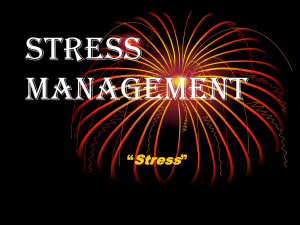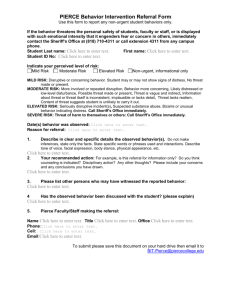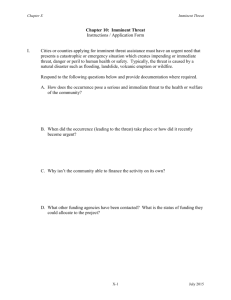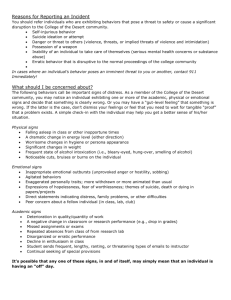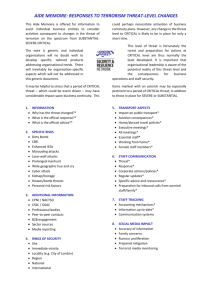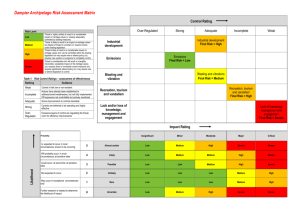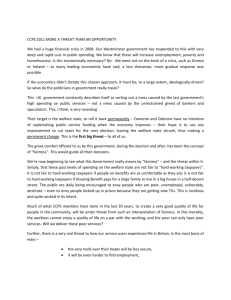The stress of being under threat - Ministry of Civil Defence and
advertisement
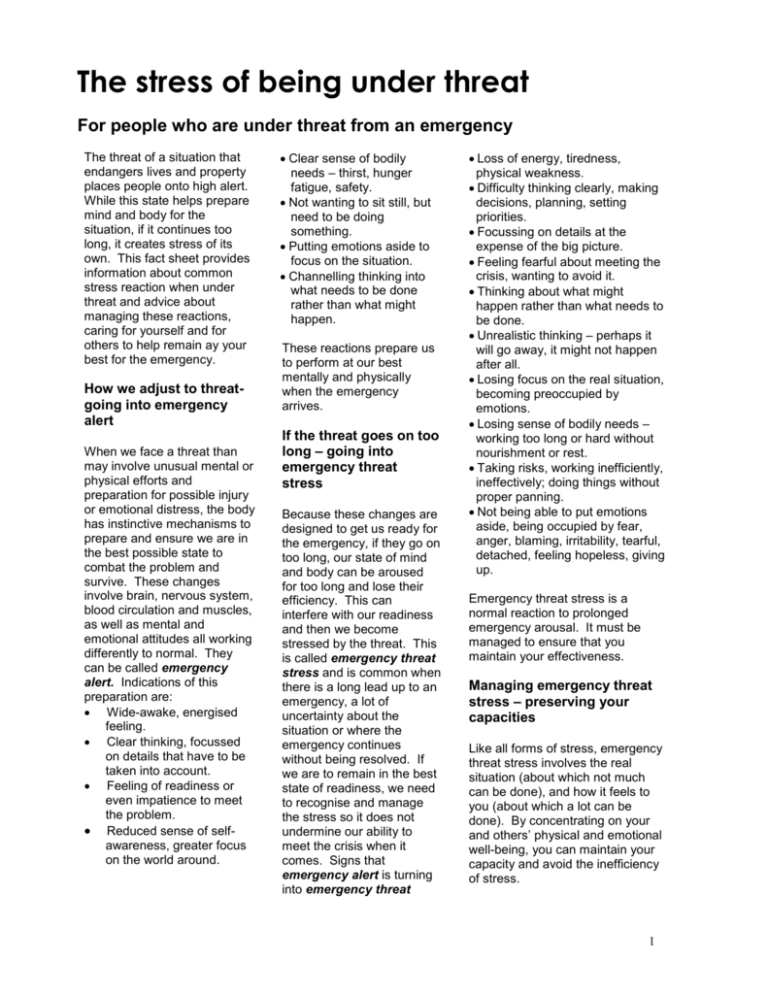
The stress of being under threat For people who are under threat from an emergency The threat of a situation that endangers lives and property places people onto high alert. While this state helps prepare mind and body for the situation, if it continues too long, it creates stress of its own. This fact sheet provides information about common stress reaction when under threat and advice about managing these reactions, caring for yourself and for others to help remain ay your best for the emergency. How we adjust to threatgoing into emergency alert When we face a threat than may involve unusual mental or physical efforts and preparation for possible injury or emotional distress, the body has instinctive mechanisms to prepare and ensure we are in the best possible state to combat the problem and survive. These changes involve brain, nervous system, blood circulation and muscles, as well as mental and emotional attitudes all working differently to normal. They can be called emergency alert. Indications of this preparation are: Wide-awake, energised feeling. Clear thinking, focussed on details that have to be taken into account. Feeling of readiness or even impatience to meet the problem. Reduced sense of selfawareness, greater focus on the world around. Clear sense of bodily needs – thirst, hunger fatigue, safety. Not wanting to sit still, but need to be doing something. Putting emotions aside to focus on the situation. Channelling thinking into what needs to be done rather than what might happen. These reactions prepare us to perform at our best mentally and physically when the emergency arrives. If the threat goes on too long – going into emergency threat stress Because these changes are designed to get us ready for the emergency, if they go on too long, our state of mind and body can be aroused for too long and lose their efficiency. This can interfere with our readiness and then we become stressed by the threat. This is called emergency threat stress and is common when there is a long lead up to an emergency, a lot of uncertainty about the situation or where the emergency continues without being resolved. If we are to remain in the best state of readiness, we need to recognise and manage the stress so it does not undermine our ability to meet the crisis when it comes. Signs that emergency alert is turning into emergency threat Loss of energy, tiredness, physical weakness. Difficulty thinking clearly, making decisions, planning, setting priorities. Focussing on details at the expense of the big picture. Feeling fearful about meeting the crisis, wanting to avoid it. Thinking about what might happen rather than what needs to be done. Unrealistic thinking – perhaps it will go away, it might not happen after all. Losing focus on the real situation, becoming preoccupied by emotions. Losing sense of bodily needs – working too long or hard without nourishment or rest. Taking risks, working inefficiently, ineffectively; doing things without proper panning. Not being able to put emotions aside, being occupied by fear, anger, blaming, irritability, tearful, detached, feeling hopeless, giving up. Emergency threat stress is a normal reaction to prolonged emergency arousal. It must be managed to ensure that you maintain your effectiveness. Managing emergency threat stress – preserving your capacities Like all forms of stress, emergency threat stress involves the real situation (about which not much can be done), and how it feels to you (about which a lot can be done). By concentrating on your and others’ physical and emotional well-being, you can maintain your capacity and avoid the inefficiency of stress. 1 stress are: Take regular food, drink and breaks; preferably before you need them, then you recharge rapidly. Don’t work ‘till you drop’ it takes too long to recover – you may not be ready for the crisis. Focus on self-care – don’t take risks – you survive best if unhurt. Respect your needs – you will perform better in the crisis. Take emotional ‘breaks’ by putting aside fears and worries for a time by doing something practical – maybe for others. Physical energy and emotions are tied together. Don’t think about emotional problems when you are tired. Promise yourself to think about it when you have rested. Manage emotions by not feeding negative feelings. Express positive emotions to others – optimism, faith in the future, confidence in survival. If you have negative emotions, talk about them rather than expressing them directly. You inspire others by how you behave rather than how you feel. When you are angry, tearful, upset take someone aside to let off steam with, rather than doing it in front of everyone – emotional distress is contagious. If you feel fearful or hopeless about how big the situation is, focus on something you can do and do it. You don’t help by thinking about bad things all the time. Even when it is urgent, take a moment to plan what you are doing, don’t just act impulsively. If you can’t think clearly or you feel overwhelmed, take time out – leaving a problem you can’t see how to solve for 5 minutes allows you to free your mind up and often a new thought comes. Combat fear about what might happen by concentrating on what needs to be don. Leave whatever is not part of the immediate crisis till after it is over, but promise yourself to deal with it then. Supporting children The effects of emergency threat on children often worry parents and adults. However, children take their lead from how they see adults managing. They are often just as able to cope with the crisis as adults, although they do it in their own way. It is important to trust your children’s common sense, knowledge and emotional strength and your knowledge of them. They need you to have faith in them. The majority of people (children included) behave sensibly and reasonably in a crisis, given their understanding of the situation and their knowledge. Therefore equip them with accurate factual information about the threat and give them accurate advice about what to do. Children show their courage by what they do, even if they express fear. If they are afraid; they need the chance to express it and for you to support and encourage them without losing confidence in their ability to cope. Children have untapped strength and are very resilient; with adult support they recover well from emergency stress. Helping children under threat Remain calm; avoid displaying unnecessary distress. Be real, explain what adults are feeling and doing, they usually already can see for themselves. Keep updating them and explaining what is happening in simple words so they can understand it. Explain what you are doing to keep them safe, show how your knowledge helps meet the threat Get them to talk about what they think might happen and correct any wrong ideas. Give them things to do to help however you can so they feel useful, even if just to keep watch. Reassure them that they are brave, will manage well and you are confident in them. Remind them that many people are trying to help and will come when they can. Show affection and comfort them when they are upset, then encourage them to meet the threat. Remember that you, your family and your community are not alone – support will be available through your local council and local and national care agencies. Further advice can be obtained from Your GP or local community health centre In the phonebook under medical white pages Child, Youth and Family 0800 FAMILY (326 459) Youthline 0800 376 633 (www.youthline.co.nz) In an emergency always call 111 This fact sheet was reproduced with the kind permission of the Department of Human Services, Victoria, Australia 2 3
